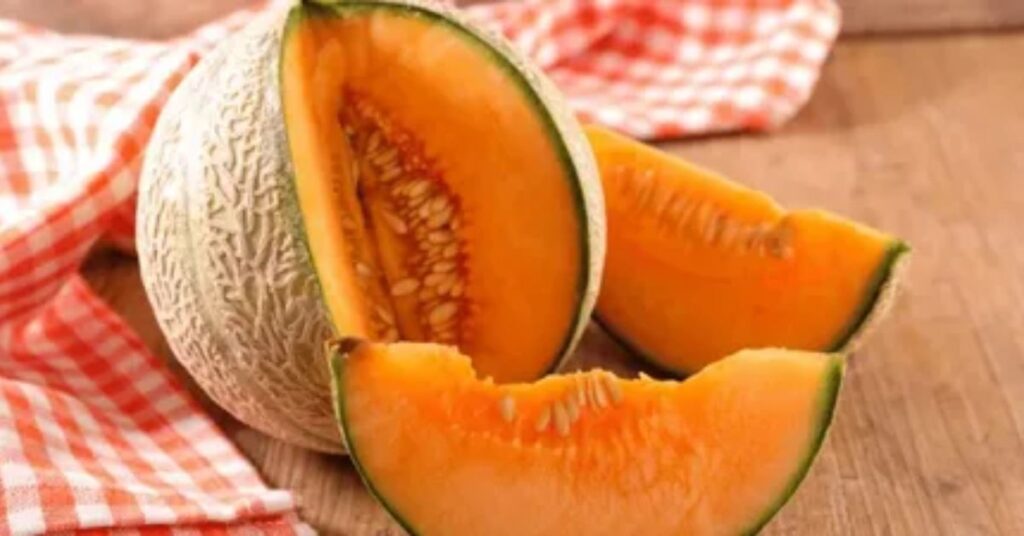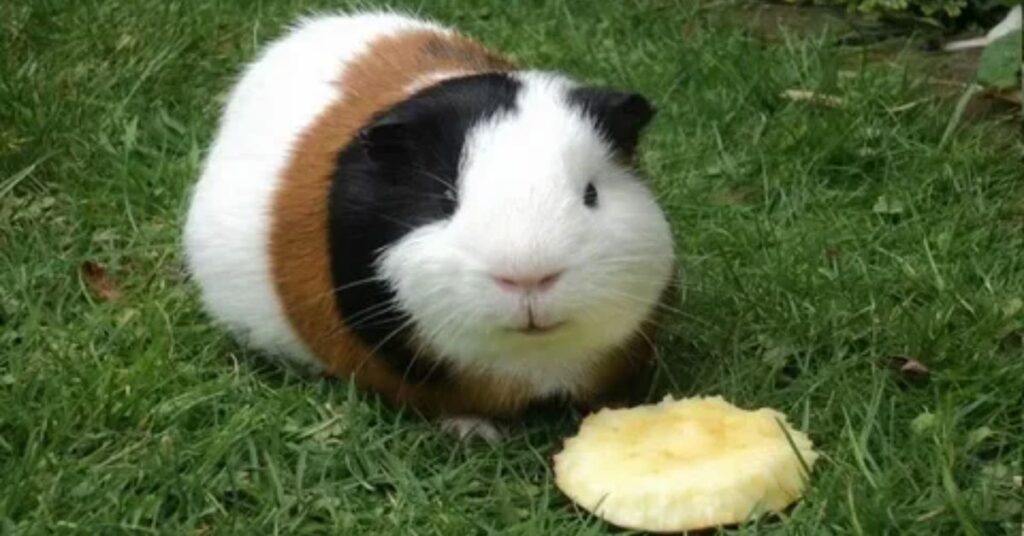Guinea pigs can safely eat cantaloupe in moderation. This juicy fruit provides hydration and essential vitamins, making it a tasty treat.
Wondering if guinea pigs can eat cantaloupe? This sweet fruit could be a fun addition to their diet. Cantaloupe is not only delicious but also packed with nutrients. Let’s find out how to safely include it!
Guinea pigs can eat cantaloupe, but moderation is crucial. The fruit’s high sugar content means too much can upset their stomachs. Offer a small piece of cantaloupe once in a while for hydration and vitamins. Always introduce it gradually to monitor any digestive reactions. By incorporating cantaloupe carefully, you can treat your guinea pig while keeping their diet balanced! If you have more questions about guinea pig nutrition or safe fruits, feel free to ask!
Vitamins and Nutrients in Cantaloupe
Cantaloupe is packed with essential vitamins and nutrients that benefit both humans and guinea pigs. This refreshing fruit is particularly rich in vitamin A, which supports healthy vision and immune function. Additionally, cantaloupe provides vitamin C, an important antioxidant that aids in collagen production and helps keep the skin healthy.

Aside from vitamins, cantaloupe is hydrating, with a high water content that helps keep guinea pigs hydrated. It also contains dietary fiber, which supports digestive health. The combination of these nutrients makes cantaloupe a nutritious, tasty treat when given in moderation.
Vitamin A
Cantaloupe is an excellent source of vitamin A, which promotes healthy vision and immune function. This vitamin plays a crucial role in maintaining eye health, particularly in low-light conditions. For guinea pigs, sufficient vitamin A helps keep their skin and fur in top condition.
Vitamin C
This fruit is loaded with vitamin C, an essential nutrient for guinea pigs. Vitamin C supports their immune system and prevents scurvy, a common deficiency in these animals. Including cantaloupe in their diet can help meet their vitamin C needs.
Hydration
With its high water content, cantaloupe offers excellent hydration. This is especially important for guinea pigs, as they require plenty of fluids to stay healthy. Keeping them hydrated helps maintain their energy levels and supports overall well-being.
Dietary Fiber
Cantaloupe provides dietary fiber, which is essential for proper digestion. Fiber helps regulate bowel movements and prevents constipation in guinea pigs. A small serving of cantaloupe can contribute to their daily fiber intake.
Potassium
Cantaloupe is rich in potassium, a mineral that helps maintain fluid balance and supports muscle function. This nutrient is vital for guinea pigs, as it aids in nerve function and overall health. Including potassium-rich foods in their diet can promote their well-being.
Antioxidants
Cantaloupe contains various antioxidants that help fight oxidative stress. These antioxidants protect cells from damage and support a healthy immune response. For guinea pigs, a diet rich in antioxidants contributes to long-term health.
Low Calories
Cantaloupe is low in calories, making it a great treat option for guinea pigs. Pet owners can offer this fruit without worrying about excessive calorie intake. A small piece can satisfy their sweet cravings while keeping their diet balanced.
Additional Benefits of Cantaloupe for Guinea Pigs
Cantaloupe offers several benefits beyond its vitamin and nutrient content for guinea pigs. This sweet fruit can serve as a delightful treat that encourages healthy eating habits. By incorporating cantaloupe into their diet, you can enhance your guinea pig’s overall well-being while providing a tasty snack.

Moreover, cantaloupe’s hydrating properties help ensure that your guinea pig stays properly hydrated. Keeping them well-hydrated is essential for their health, especially during warmer months. The combination of flavor and hydration makes cantaloupe a fantastic addition to your guinea pig’s diet.
Encourages Hydration
Cantaloupe is over 90% water, making it an excellent source of hydration. For guinea pigs, staying hydrated is crucial for maintaining energy levels and promoting healthy organ function. Including cantaloupe in their diet can help prevent dehydration, especially during hot weather or after exercise.
Supports Digestive Health
The dietary fiber in cantaloupe aids in maintaining a healthy digestive system. This fiber promotes regular bowel movements and can help prevent gastrointestinal issues in guinea pigs. A healthy gut is essential for overall wellness, and cantaloupe can be a tasty way to support this.
Boosts Immune Function
The vitamins in cantaloupe, particularly vitamin C, play a significant role in boosting immune function. A strong immune system helps guinea pigs fend off infections and illnesses. Regularly offering cantaloupe can contribute to their overall health and resilience.
Provides a Healthy Snack Option
Cantaloupe serves as a nutritious alternative to sugary or processed snacks. This natural fruit satisfies your guinea pig’s sweet tooth while providing valuable nutrients. Opting for cantaloupe over unhealthy treats helps keep their diet balanced and supports long-term health.
Enhances Mental Stimulation
Introducing new foods like cantaloupe can stimulate your guinea pig’s curiosity and interest in their diet. This mental engagement is essential for their overall happiness and well-being. Keeping mealtime exciting with varied foods encourages healthy eating habits.
Aids in Weight Management
Cantaloupe is low in calories, making it a great option for guinea pigs needing to manage their weight. Offering small portions allows them to enjoy a sweet treat without overloading on calories. Balancing treats like cantaloupe helps maintain a healthy weight in your furry friend.
Provides Nutritional Variety
Including cantaloupe in your guinea pig’s diet adds variety and encourages a diverse intake of nutrients. This variety is essential for a balanced diet, ensuring they receive all the nutrients they need. A diet rich in different foods can promote better health and happiness for your guinea pig.
Downsides of Cantaloupe for Guinea Pigs
While cantaloupe offers many benefits, it also has some downsides that guinea pig owners should consider. High sugar content can lead to digestive issues and weight gain if given in excess. It’s essential to monitor your guinea pig’s intake to ensure they enjoy cantaloupe safely.
Additionally, introducing any new food, including cantaloupe, can cause gastrointestinal upset. Some guinea pigs may be more sensitive to changes in their diet. Being aware of these potential downsides can help you make informed decisions about your pet’s nutrition.
High Sugar Content
Cantaloupe contains a significant amount of natural sugars. While this sweetness makes it appealing, too much sugar can lead to obesity and diabetes in guinea pigs. To avoid these health risks, limit their portion sizes and offer cantaloupe only as an occasional treat.
Risk of Diarrhea
If guinea pigs consume too much cantaloupe at once, they may experience diarrhea. This digestive upset can lead to dehydration, which is dangerous for small animals. Always introduce cantaloupe gradually and monitor your guinea pig for any signs of digestive distress.
Potential for Allergic Reactions
Some guinea pigs may have sensitivities or allergies to certain fruits, including cantaloupe. If your guinea pig shows any signs of discomfort after eating this fruit, discontinue feeding it immediately. Always observe how your pet reacts to new foods to ensure their safety.
Impact on Dental Health
Cantaloupe is soft and sweet, which can encourage guinea pigs to chew less on their hay or other fibrous foods. Reducing their hay intake can negatively affect their dental health. Make sure to provide plenty of hay alongside any fruit treats to maintain their dental and digestive health.
Nutritional Imbalance
Relying too much on cantaloupe or other fruits can lead to a nutritional imbalance. Guinea pigs require a diet rich in hay, fresh vegetables, and limited fruits. Keep their diet diverse to ensure they receive all the necessary nutrients for optimal health.
Do Guinea Pigs Like Cantaloupe?
Guinea pigs often enjoy the sweet taste of cantaloupe, making it a popular treat among many. This juicy fruit can excite their taste buds and provide a refreshing snack. However, individual preferences can vary, so not every guinea pig will have the same reaction to cantaloupe.
While many guinea pigs will eagerly munch on cantaloupe, some may be indifferent or even dislike it. It’s always best to introduce new foods slowly and observe your pet’s reactions. Understanding their preferences helps you provide a balanced diet that they enjoy.
| Feature | Details |
| Description | Sweet and juicy fruit, a popular treat for guinea pigs |
| Taste | Sweet and juicy, a delightful snack |
| Texture | Soft and easy to chew, gentle on teeth |
| Nutritional Value | High in vitamins A and C |
| Hydration | Contains over 90% water, helps with hydration |
| Frequency of Feeding | Treat, once a week max |
| Guinea Pig Preference | Many enjoy it, but not all may like it |
Individual Preferences
Guinea pigs, like humans, have unique taste preferences. Some may love the sweetness of cantaloupe, while others might prefer different fruits or vegetables. Offering a variety of options allows you to discover what your guinea pig truly enjoys.
Gradual Introduction
When introducing cantaloupe, start with a small piece to gauge your guinea pig’s reaction. This gradual approach helps prevent digestive upset and allows you to monitor their preferences. If they enjoy it, you can offer cantaloupe as an occasional treat.
Observing Reactions
Pay attention to how your guinea pig responds after eating cantaloupe. Signs of enjoyment include nibbling eagerly and returning for more. Conversely, disinterest or refusal to eat may indicate that they don’t like it.
Pairing with Other Foods
Combining cantaloupe with other fruits or veggies can make it more appealing. Guinea pigs often enjoy mixing flavors and textures, which can enhance their mealtime experience. Just ensure that any combinations are safe and healthy for them.
Treat in Moderation
Even if your guinea pig enjoys cantaloupe, remember to offer it in moderation. Too much fruit can lead to health issues like obesity or digestive problems. Keeping treats balanced ensures your guinea pig remains happy and healthy.
Feeding Your Guinea Pig Cantaloupe
When introducing cantaloupe to your guinea pig’s diet, start slowly to monitor their reaction. Guinea pigs can eat cantaloupe, but it’s important to ensure they don’t overindulge. A small piece can be a delightful treat, but moderation is key to avoiding digestive issues.
Make sure to wash the cantaloupe thoroughly remove the seeds and rind before offering it to your pet. Guinea pigs can eat cantaloupe, but only the soft flesh should be included in their diet. Keeping their portions small helps maintain a balanced diet while allowing them to enjoy this sweet fruit.
Guidelines for Feeding Cantaloupe
- Start Small: Introduce a tiny piece to see how your guinea pig reacts.
- Wash Thoroughly: Rinse the cantaloupe to remove any pesticides or contaminants.
- Remove Seeds: Always discard seeds to prevent choking hazards.
- Cut into Pieces: Slice the cantaloupe into small, manageable pieces for easy eating.
- Limit Frequency: Offer cantaloupe as an occasional treat, not a daily food.
- Monitor Reactions: Watch for any signs of digestive upset after feeding.
- Balance Diet: Ensure cantaloupe complements a diet rich in hay and vegetables.
- Check for Freshness: Only give fresh cantaloupe; avoid any that is overripe or moldy.
- Store Properly: Keep leftover cantaloupe in the fridge to maintain freshness.
- Avoid Sugar Overload: Be mindful of your overall sugar intake to prevent health issues.
- Pair with Veggies: Consider pairing cantaloupe with leafy greens for variety.
- Consult a Vet: If unsure, consult a veterinarian about your guinea pig’s diet needs.
Is It OK to Feed Your Guinea Pigs Cantaloupe?
Overall, it is perfectly fine to feed your guinea pigs cantaloupe in moderation. This sweet fruit provides essential vitamins and hydration, making it a delightful treat. Just remember to monitor their intake to avoid any digestive issues.
As with any new food, introducing cantaloupe should be done gradually. Observing your guinea pig’s reactions will help you determine their preferences and tolerance. With proper care, cantaloupe can be a safe and enjoyable addition to their diet.
What Else Can Guinea Pigs Eat?
In addition to cantaloupe, guinea pigs can enjoy a variety of fresh fruits and vegetables. Leafy greens like kale, romaine lettuce, and parsley are excellent staples in their diet. These foods provide essential nutrients and promote overall health.
Guinea pigs can also eat small amounts of other fruits such as bell peppers, strawberries, and apples. Always ensure that any new food is introduced slowly and in appropriate portions. A balanced diet rich in hay, fresh veggies, and limited fruits keeps your guinea pig happy and healthy!
FAQs
Can guinea pigs eat cantaloupe every day?
No, guinea pigs should not eat cantaloupe every day. It’s best to offer it as an occasional treat due to its high sugar content.
How much cantaloupe can I give my guinea pig?
Limit the serving to a small piece, about the size of a quarter. This ensures they enjoy the fruit without overindulging.
Should I remove the seeds from the cantaloupe?
Yes, always remove the seeds from the cantaloupe before feeding it to your guinea pig. Seeds can pose a choking hazard.
Is cantaloupe good for guinea pigs?
Cantaloupe is nutritious and offers hydration. It contains vitamins A and C, which are beneficial for their health.
What other fruits can guinea pigs eat?
Guinea pigs can enjoy fruits like strawberries, apples, and blueberries. Introduce new fruits slowly and in moderation.
Conclusion
In conclusion, guinea pigs can safely enjoy cantaloupe as a delightful treat. This fruit provides essential vitamins and hydration but should be given in moderation. Always observe your guinea pig’s reactions to ensure they tolerate new foods well.
A balanced diet is vital for keeping your guinea pig healthy and happy. Alongside cantaloupe, include plenty of hay and a variety of fresh vegetables. This approach ensures your furry friend receives all the nutrients they need for a vibrant life.
Also Read:
- How Much Does a Labradoodle Shed? 10 Grooming Tips
- Border Collie breed insights: care, personality, and expert health tips

Emerson is an expert in the world of pets, specializing in understanding diverse breeds, nutrition, and health. His deep knowledge ensures your pets receive the best care, from balanced diets to top-notch health advice, keeping them at their happiest and healthiest.











